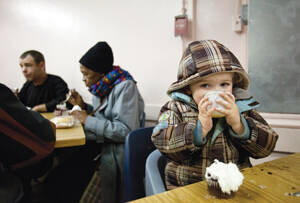The impact of increasing poverty and the diminished economic resources of the U.S. middle class became evident in late November. The U.S. Census Bureau reported that poverty among school-age children showed “a statistically significant increase” in one in five counties across the nation, and an analysis by The New York Times of Department of Agriculture data concluded that the number of students receiving subsidized school lunches rose to 21 million in the 2009-10 school year from 18 million in 2006-7, a 17 percent increase. According to the analysis, 11 states had four-year increases of 25 percent or more, “huge shifts in a vast program long characterized by incremental growth.”
Reports from Catholic Charities USA agencies across the nation were just as discouraging. According to the organization’s 2011 Third Quarter Snapshot Survey, 66 percent of Catholic Charities agencies saw an increase in requests for assistance from families with children and 59 percent reported increases in aid requests from middle-class families. Eighty percent report increased requests for assistance from the working poor.
Perhaps most alarming were the snapshot’s findings related to the toll the rising demand was having on C.C.U.S.A. capacity. More than 88 percent of local agencies reported that they maintained a waiting list or had to turn people away for at least one of their programs or services in the last quarter, and 64 percent reported that they could not meet the need they faced for emergency financial assistance. Fifty-six percent of Catholic Charities agencies were unable to respond to some requests for utility assistance.
Commenting on the report, the Rev. Larry Snyder, president of Catholic Charities USA, said that while the need for food and utility assistance has been consistent, never in his experience had so many agencies been forced to turn clients away or place families on waiting lists. “Many never had to do this in the past,” he said. “This is really very difficult emotionally for our staff, to have to do that.”
With Christmas fast approaching, Catholic Charities USA is anticipating a struggle to keep enough food stocked in its pantries and to respond to requests for help paying heating bills as the winter cold sets in. Father Snyder urged Catholics to respond individually to the increasing need as creatively as they could in their own communities but added that the deteriorating conditions suggest that advocacy on behalf of the poor remains critical. “Washington keeps playing around with how we are going to become more fiscally responsible,” he said, “but that can’t begin with the poor.
“That is a commitment that we have made in the past that should remain sacred, that is a commitment given to us by God through Scripture,” said Father Snyder. The notion that the nation should begin restoring fiscal balance by reducing or eliminating nutritional, housing and other services for the poor “betrays our beliefs, our faith and the vision that we have for this country.”
“These are difficult times,” Father Snyder said, “but we cannot begin there.” Middle- and upper-class Americans may have to sacrifice more, he said, to prevent the “already disadvantaged from experiencing more hardship.”








